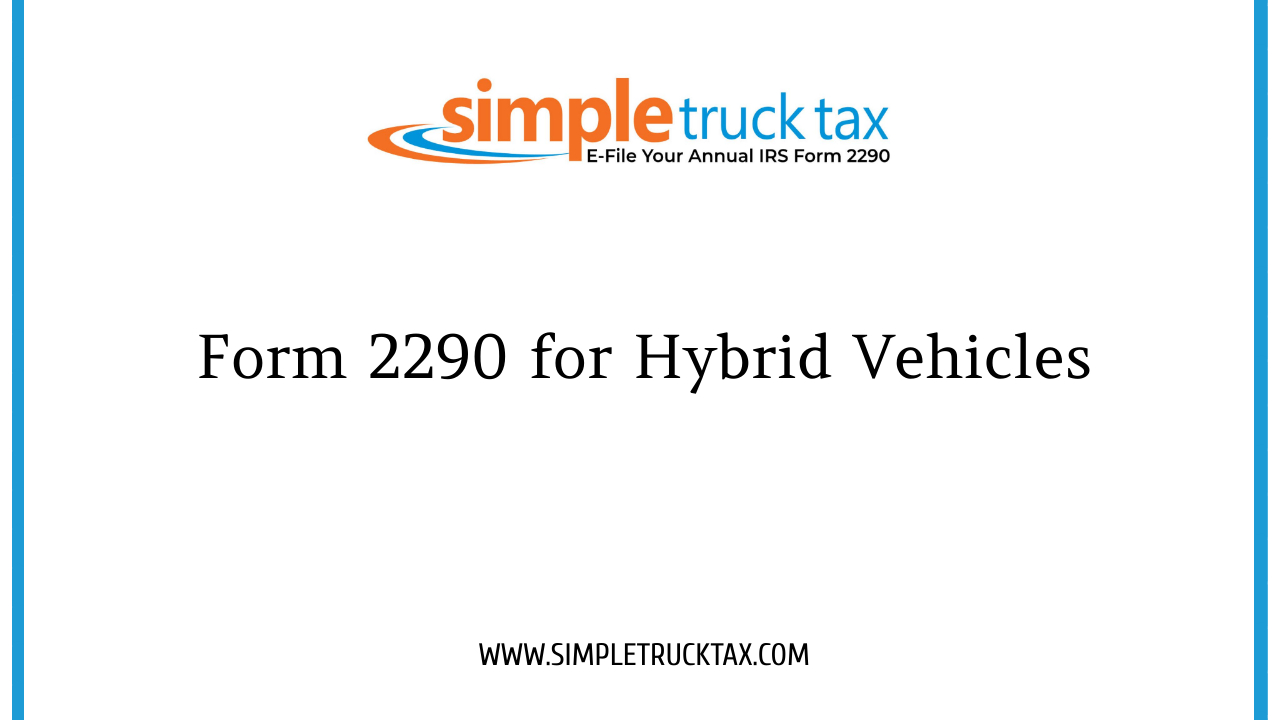11-01-2024
Form 2290 for Hybrid Vehicles
Form 2290 for Hybrid Vehicles: All You Need to Know
With advancement towards sustainable transportation, still a part of the trucking industry, hybrid vehicles gain their buyers. Hybrid trucks over 55,000 lbs should also file this Form 2290. In this section, we discuss everything needed to know when filing a Form 2290 about a hybrid vehicle, in-depth steps, exceptions and how to efficiently file form 2290.
What is Form 2290?
Form 2290 is an IRS form, which is used to report and pay the "Heavy Vehicle Use Tax (HVUT)". It is imposed on vehicles that have a gross weight of 55,000 pounds or more and are utilized on public highways. This tax is used for funding road maintenance and infrastructure, as it is essential for supporting trucking.
Hybrid Vehicles and Form 2290: What You Need to Know
Definition of a Hybrid Vehicle
It's a hybrid vehicle that takes the best of a traditional internal combustion engine and teams it with an electric motor to achieve better fuel economy and lower emissions. For this reason, these cars are usually bigger and more massive, and thus placed in the heavy vehicle group, which means they attract HVUT liability.
Does Form 2290 Apply to Hybrid Vehicles?
Yes, a hybrid truck still falls in the filing requirement, except if your truck's GVW is 55,000 pounds or greater. Hybrid vehicles often fuel more efficiently and consume the environment better, leaving an owner to question if hybrids are eligible for tax discounts or have a special exception. Sadly, there isn't any tax discount to be given on a Hybrid vehicle using Form 2290; the vehicle follows traditional weight and mileage rates for filing.
How and When to File Form 2290 with Your Hybrid Vehicle
Every year, the IRS requires you to file **Form 2290** using a tax period that covers July 1st to June 30th of the next calendar year. Whenever you buy a new hybrid vehicle or one becomes operational during a tax year, you will need to file Form 2290 on or before the **last day of the month following the month in which the vehicle first is used**. For example, if your hybrid truck begins operation in October, you are required to file Form 2290 by the end of November.
How to Calculate Hybrid Truck Tax
Gross Weight Calculation
The gross weight is the major factor in calculating the tax to be paid. In the case of hybrid trucks, the gross weight calculation is the same as for any heavy vehicle. The amount that you are to calculate for the gross weight of a hybrid truck is:
The **unladen weight** of the vehicle,
-The weight, without trailers, of any trailers regularly used in conjunction with a vehicle;
- The gross weight weight routinely carried both by a vehicle and its trailers
IRS Weight Classifications and Tax Rates
Once you know your gross weight, check the IRS weight classes for the tax rate applicable to your vehicle. Hybrids are taxed just like any other heavy vehicle within a weight class, and the tax increases with gross weight does.
For instance,
Those between 55,000 and 75,000 pounds pay in the ballpark of $100 to $410 per year.
Those over 75,000 pounds pay a flat rate of $550 per year.
Hybrid trucks: Special Low-Annual Use exemption
If your hybrid truck travels 5,000 miles or less on public roads during a tax year, you receive tax suspension. You do not have to pay the HVUT and instead file Form 2290 and indicate that you used your vehicle less than 5,000 miles for the year.
If you are not sure what Form 2290 requirements are, especially in regard to hybrid vehicles, call a tax professional to avoid errors, penalties, or missing deductions.
Practically, filling **Form 2290** for a hybrid truck is not far from what is required while filling Form 2290 for a classic heavy truck. You become aware of the weight norms, the mileage limits as well as the filing obligations so you can easily execute your tax obligations. Therefore, given the increasing prominence of hybrid trucks, becoming compliant with the IRS could be quite essential for achieving good trucking success and saving the earth.


